Why Is My Cat Lying in the Litter Box? 6 Vet-Reviewed Reasons
By Ed Malaker
Updated on
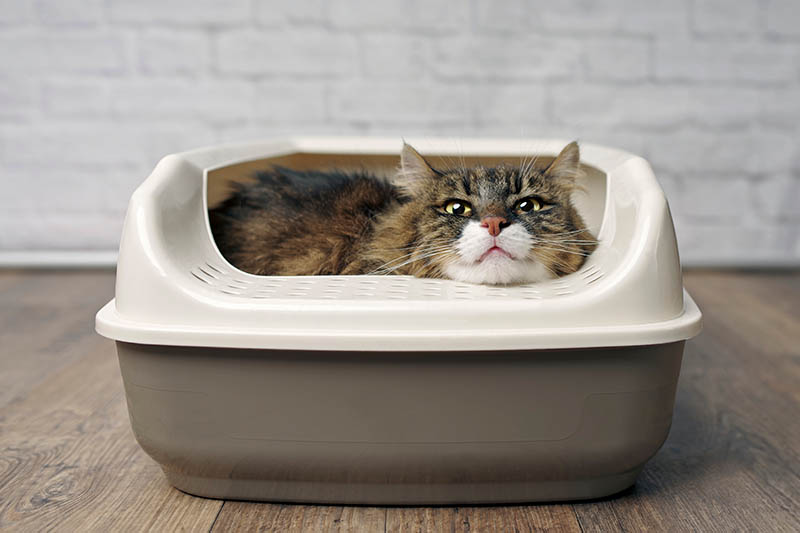
Click to Skip Ahead
Cats are popular pets; second only to dogs in the hearts of Americans. However, they are capable of strange behaviors that can be difficult to understand. One behavior that confuses many pet owners is when their cat lies in the litter box or sits in there doing nothing. If you notice this behavior from your pet, keep reading for several possible explanations, from potential medical issues, to the box simply being a source of comfort. We also provide tips for discouraging this behavior, and answer other common questions to help you be better informed.
The 6 Resons Cats Choose Strange Beds Like Litter Boxes
1. Warmth and Security
Cats are creatures of comfort, and the litter box can provide a warm and secure environment. The litter retains heat, making it a toasty spot for a cat to curl up, and the walls of the litter box offer a sense of enclosure, making cats feel safe and protected from potential threats. You might see them using the box for protection more often if you have moved to a new living environment or acquired a new pet. It is very common for a cat to use their litter box as a bed at the veterinary hospital or boarding cattery, despite a pet bed being provided.
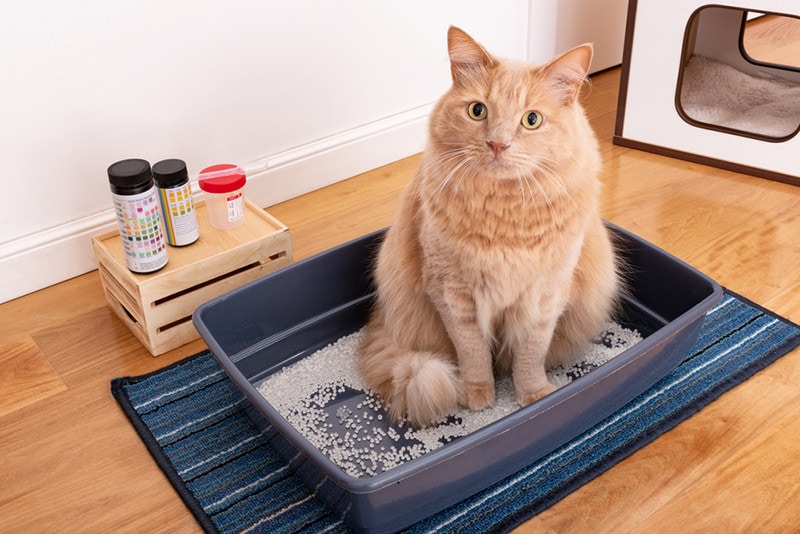
2. Familiar Scent
Cats have a keen sense of smell, and their litter’s scent can help reassure and comfort them. Lying in the litter box might allow your cat to surround themselves with a familiar and comforting odor. For example, moving to a new location can cause your cat to seek out familiar scents, which might result in them sitting in their litter box.
3. Territorial Instincts
Cats are territorial animals, and the litter box is a part of their territory. By lying in the litter box, your cat may assert dominance over this area or mark it as their own. You might see this behavior if you get a new cat, and the old cat wants to keep the box to themselves. That’s why it’s best to have one box for each cat, plus one extra.
4. Feline Lower Urinary Tract Disease (FLUTD)
A cat with a urinary tract infection, urine crystals, or cystitis may associate the litter box with relief from pain and discomfort and spend more time there, trying to alleviate their clinical signs. Contact your vet immediately if you notice other signs of a urinary tract infection, like frequent urination, blood in the urine, or straining or crying when urinating.
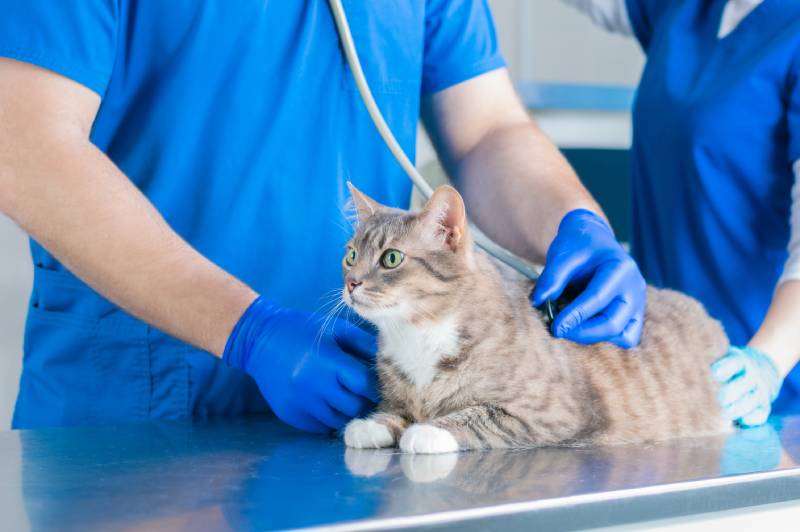
5. Gastrointestinal Problems
Digestive issues or an upset stomach can lead to more frequent bowel movements or diarrhea, and your cat might lie in the litter box because they feel the need to go often or find it a convenient place to relieve themselves urgently.
Constipation can drive a cat to the litter box, as they may associate it with the relief that they feel when they finally have a bowel movement.
6. Stress and Anxiety
Cats are sensitive creatures, and stress or anxiety can manifest in various ways, including unusual behavior. If your cat is experiencing emotional distress, they might sit in the litter box to cope with their feelings.
The 6 Things to Do If Your Cat Is Sitting in the Litter Box Doing Nothing
1. Monitor Your Cat’s Behavior
Keep a close eye on your cat’s behavior, and pay attention to any differences in their habits, such as changes in eating, drinking, or litter box usage. This information will be valuable when discussing the issue with your veterinarian.
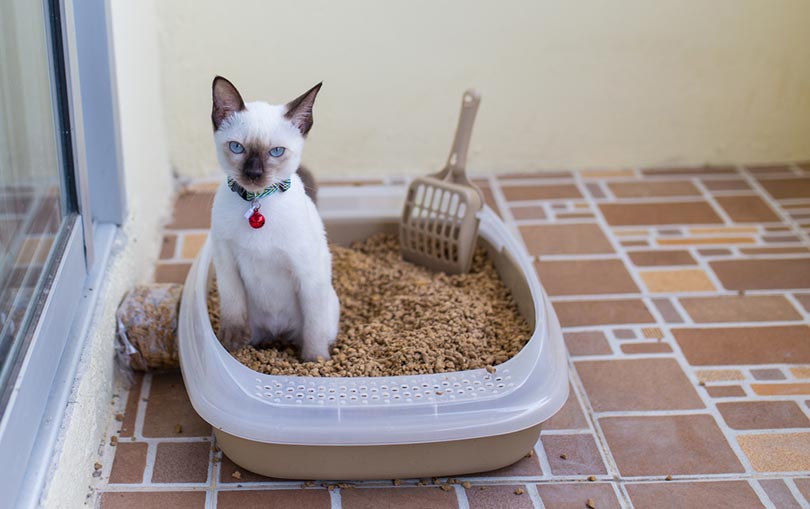
2. Consult Your Veterinarian
If you suspect a health issue is causing your cat to lie in the litter box, consult your veterinarian and schedule a checkup. They can perform a thorough examination, run tests, and provide a diagnosis to help you determine if there is a problem and get your cat back to normal.
3. Keep the Litter Box Clean
Maintain a clean litter box environment. Most cats will avoid a dirty or smelly litter box, but some will still want to sit in it and thus become covered in filth. Ensuring cleanliness can help keep your cat happy and clean, and it can also help reduce fights between cats over remaining clean ones. Having multiple litter boxes is vital.
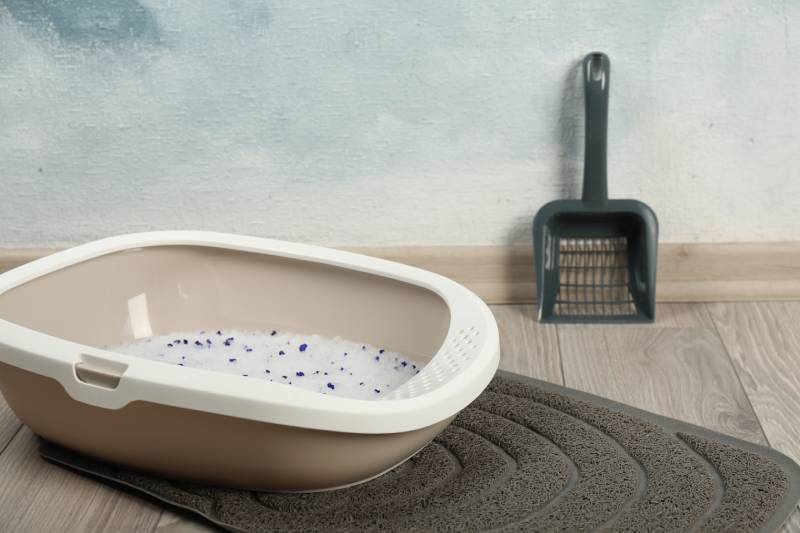
4. Eliminate Stressors
If stress or anxiety is a potential cause of your cat’s strange behavior, identify and address any stressors in your cat’s environment. Providing a calm and secure space can help alleviate their anxiety and help them feel more comfortable in other parts of the home.
Pheromone analogues or herbal stress & anxiety diffusers can also help your cat feel more settled and secure in their environment and are particularly helpful in multi-cat households.
5. Consider Environmental Enrichment
Provide toys, scratching posts, and interactive play to keep your cat mentally and physically stimulated, which can help them feel more comfortable and relaxed and less likely to seek refuge in the litter box.
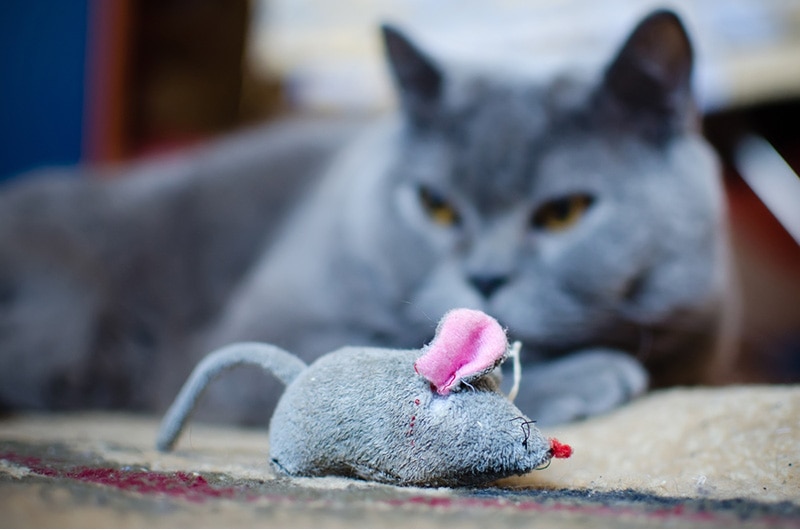
6. Introduce New Pets Slowly
Cats are territorial animals that usually prefer to be the only pet. Introducing a new animal too quickly can cause stress and anxiety, which might result in your cat sitting in the litter box doing nothing. Separating the pets at first and introducing them slowly can increase your cat’s chances of accepting the new arrival without resorting to strange behavior like sitting in the litter box.
Frequently Asked Questions
Is It Normal for a Cat to Lie in the Litter Box?
While it’s not standard behavior, cats will occasionally rest in their litter boxes for various reasons, including seeking warmth, having security, or marking territory. However, if this behavior becomes frequent, it may indicate an underlying issue that needs attention.
Should I Be Concerned If My Cat Is Lying in the Litter Box Regularly?
If your cat constantly spends time in the litter box, it could be a sign of a health problem like urinary tract infections, gastrointestinal issues, stress, or anxiety. Monitor them closely, and contact a vet if you notice signs of a health problem.
How Can I Prevent My Cat From Lying in the Litter Box?
Preventing your cat from lying in the litter box depends on the underlying cause. Maintain a clean litter box, address potential health issues, provide a stress-free environment, and offer alternative comfortable and secure resting spots for your cat.
Can Changing the Type of Litter or Litter Box Affect This Behavior?
Yes, changes in litter type or the litter box itself can influence your cat’s behavior. Cats can be particular about their litter preferences, so make changes gradually and observe how your cat reacts. They may need time to adjust to the new setup.
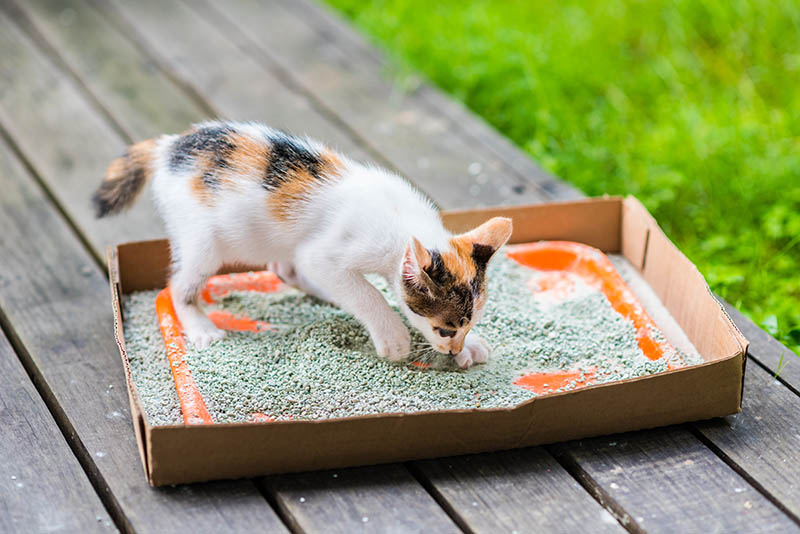
Summary
If your cat is sitting or lying in the litter box at times, they may simply find it comfortable and warm. However, if they continue to do it, it could be a sign of an underlying health problem, like a urinary tract infection, and you should contact a vet and schedule an exam. If you recently moved to a new location or acquired a new pet, your cat might be suffering anxiety or stress, and they may be trying to mark their territory. Providing mental and physical stimulation can help, as can introducing the pets slowly so they have time to adjust. Owning multiple litter boxes and keeping them clean is vital, especially if you have more than one cat.
Featured Image Credit: Lightspruch, Shutterstock












